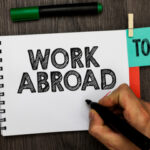The Honest Truth About Landing Your First Job When Working Abroad.
Let’s be real — the idea of working abroad sounds exciting. You picture yourself in a new city, maybe sipping coffee in a cozy European café or walking through bustling streets in Asia, finally living that “dream life” you’ve seen in travel videos. It feels freeing, adventurous, and full of opportunity.
But here’s the thing no one really tells you: landing your first job abroad is rarely a smooth ride. It’s not just about packing your bags and hopping on a plane. It’s a process that will test your patience, your confidence, and sometimes even your sense of self.
This isn’t to scare you off — far from it. Working abroad can be one of the best decisions you’ll ever make. But before you jump in, you deserve the truth — the honest, unfiltered version that most people leave out.
Secure job with no certificate
The Honest Truth About Landing Your First Job When Working Abroad
The “Dream Job Abroad” Hype vs. Reality
Everyone loves to share the glossy side of working abroad — the travel photos, the new friends, the cultural experiences. But behind every success story is usually a long, messy process filled with rejections, visa struggles, and uncertainty.
Many newcomers assume that being “qualified” or “hardworking” is enough. But employers overseas often look for more than just skill — they want someone who understands the local work culture, can adapt quickly, and ideally doesn’t come with complicated visa requirements.
This means your dream job might not be waiting for you right off the plane. You might have to start smaller, accept a lower position, or even volunteer just to get your foot in the door. That’s okay. The first job is rarely about glamour — it’s about entry.
Your Qualifications Might Not Translate Perfectly
One of the biggest shocks for many job seekers is realizing that their degrees or professional certifications don’t always hold the same weight abroad.
For instance, a qualification that’s highly respected in your home country might require revalidation, extra courses, or exams before it’s recognized internationally. Some industries are strict about licensing — especially in fields like medicine, law, or education.
That doesn’t mean your background is useless. It just means you’ll need to be strategic. Focus on transferable skills — communication, teamwork, leadership, and adaptability. These matter more than you think, and they travel better than any certificate ever will.
The Language Barrier Is Real (Even in English-Speaking Countries)
You might think you’re safe if you’re heading somewhere English is spoken, but here’s the surprise — language and communication go beyond words.
Accents, idioms, slang, and cultural cues can make everyday conversations challenging. You might feel out of place at first, even if you technically “speak the language.” And if you’re moving to a non-English-speaking country, the struggle doubles.
Investing time to learn the local language — even just the basics — can change everything. It shows respect, helps you connect faster, and sometimes even opens doors to job opportunities that would otherwise be closed.
Networking Abroad Is Not the Same
In many countries, job opportunities aren’t just posted online — they’re shared through networks. And that’s where most newcomers struggle. You arrive in a new place, knowing no one, and suddenly realize that LinkedIn alone won’t cut it.
The truth is, networking abroad feels awkward at first. You’ll attend events where you don’t know anyone, have conversations that feel forced, and send messages that get ignored. But that’s how it starts.
The key is consistency. Attend local meetups, join online communities in your field, connect with other expats, and don’t be afraid to reach out for advice. People are often more willing to help than you expect — especially if they’ve walked the same path before.
The Visa and Work Permit Maze
Let’s not sugarcoat this: visas can be one of the most frustrating parts of the journey. Every country has its own rules, requirements, and paperwork nightmares. Some places favor certain professions or nationalities. Others require a job offer before you can even apply for a visa.
It’s important to do your homework early. Research the types of visas available, the processing times, and the requirements. If possible, reach out to immigration consultants or join online expat groups where people share their real experiences.
And remember — don’t quit your job at home until you’re sure about your legal ability to work abroad. Many have learned that lesson the hard way.
You Might Have to Start Over — and That’s Okay
This is the part that hits most people the hardest. When you move abroad, your professional reputation resets. You could have years of experience back home, but to employers in your new country, you’re just another résumé.
Some people find themselves starting from a junior position, freelancing, or working in a completely new field. It can feel unfair, but it’s part of the process of rebuilding your credibility in a new environment.
Instead of seeing it as a setback, view it as a fresh start. You’re gaining international experience, learning new systems, and growing your network — things that can pay off in big ways down the road.
Cultural Adjustment Is More Important Than You Think
Landing a job is just one part of the puzzle. Thriving in that job — that’s another story. Work culture varies wildly from country to country. What’s seen as “respectful” in one culture might seem “cold” in another.
For example, some countries value direct feedback, while others see it as rude. Some expect you to work long hours; others prioritize work-life balance. Understanding these nuances can make the difference between fitting in and feeling like an outsider.
The best approach is observation. Listen more than you speak in your first few weeks. Ask questions when you’re unsure. Show curiosity instead of judgment.
Rejections Will Come — Don’t Take Them Personally
Let’s be honest: rejection stings, especially when you’re in a new country, trying to prove yourself. You’ll send out applications that go unanswered. You’ll get interviews that end with polite rejections.
It happens to everyone. The trick is not to take it personally. Sometimes it’s not about you — it’s about visa issues, timing, or internal company rules. Keep applying. Each “no” brings you closer to the “yes” that matters.
The Reward: Growth Beyond the Job
For all the challenges, working abroad offers something priceless — growth. You become more adaptable, resilient, and open-minded. You learn how to navigate uncertainty, build relationships across cultures, and think globally.
It changes how you see yourself and the world. The confidence that comes from knowing you can build a life in a completely new environment is something few experiences can match.
Final Thoughts
Landing your first job abroad isn’t a fairytale. It’s hard work, often filled with rejection, paperwork, and moments of doubt. But it’s also one of the most rewarding decisions you can make.
You’ll learn to reinvent yourself, expand your worldview, and discover a strength you didn’t know you had.
So, if you’re dreaming about working abroad — dream boldly, but prepare honestly. Do your research, manage your expectations, and commit to the process.
Because the honest truth is this: getting that first job abroad won’t be easy — but it will be worth it.










